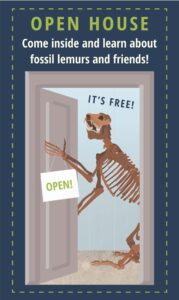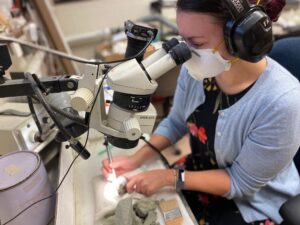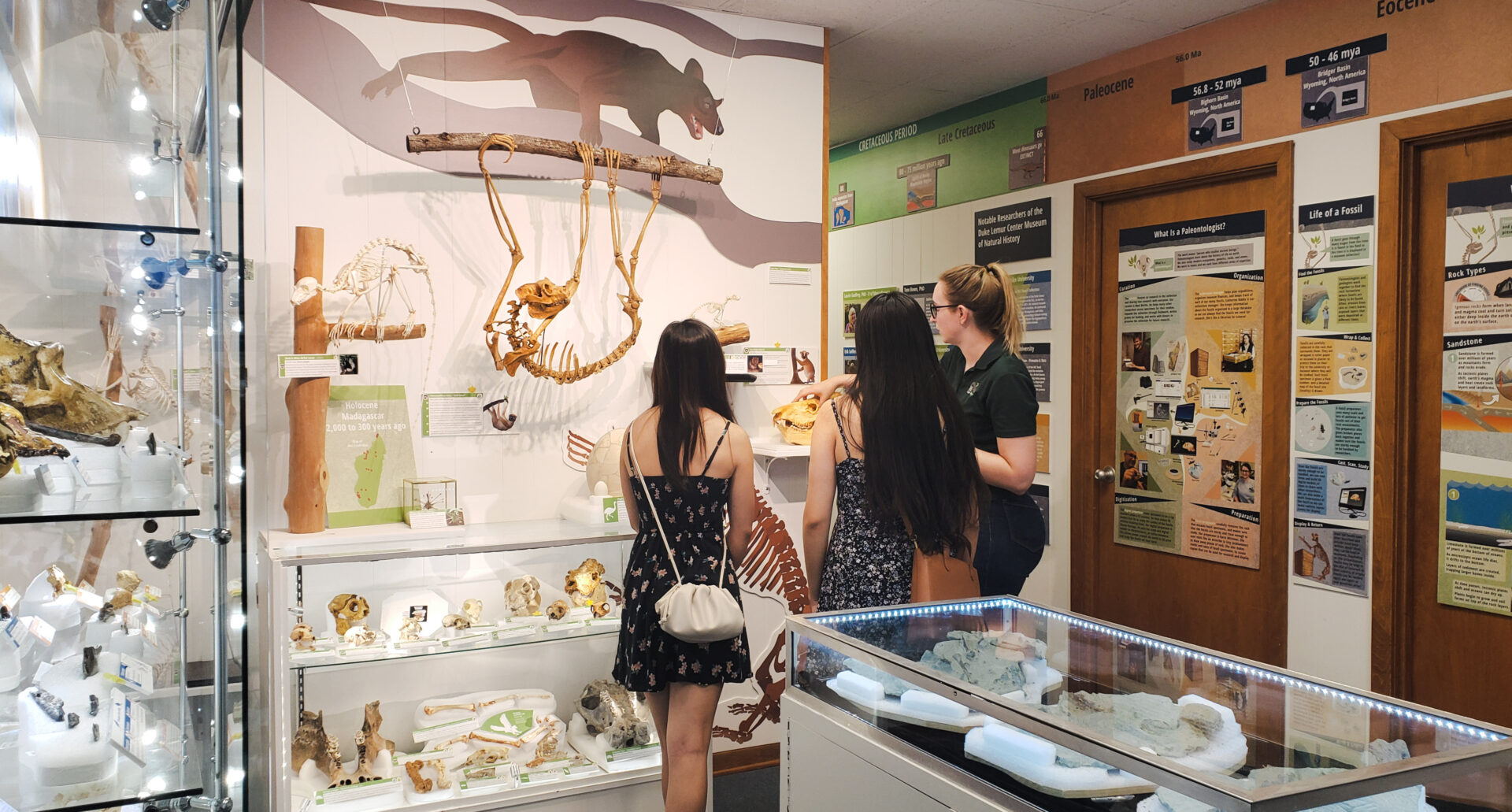Limited Visiting Hours
We would love to share the DLC Museum of Natural History with you, but the Museum is only open to the public on select days each month. Please make sure you read through our options below to plan your visit!
Come to an Open House (Free!)
 We open our doors the last Saturday of each month (with some adjustments around the holidays)! Come meet the ancient relatives of lemurs and humans, and meet the scientists who study them while glimpsing behind the scenes in our collections! If you have already visited us, our fossils say thanks for the company.
We open our doors the last Saturday of each month (with some adjustments around the holidays)! Come meet the ancient relatives of lemurs and humans, and meet the scientists who study them while glimpsing behind the scenes in our collections! If you have already visited us, our fossils say thanks for the company.
Note: THE MUSEUM IS *NOT* AT THE DLC MAIN CAMPUS. We’re located on 1013 Broad Street in Durham, so you can grab lunch or a mid-afternoon snack on Ninth Street or Broad Street before or after you stop by!
Upcoming open houses:
Saturday 9/27 1:00PM – 4:00PM EST
Saturday 10/25 1:00PM – 4:00PM EST
Want to help support the collection? You can donate to support the DLC Museum of Natural History’s fieldwork and maintenance of our invaluable collection of early primate fossils by clicking HERE.
(ON HOLD) Wild Workshop: Night at the Museum

Fossil Preparator Karie Whitman delicately removes the rock covering a fossil discovered on a field expedition.
What: Did you know that the DLC Museum of Natural History is home to one of only two fossil prep labs in the entire state of North Carolina? On our brand new Wild Workshop: Night at the Museum, you’ll learn tips and tricks of the fossil trade from DLC Museum Curator Dr. Matt Borths and Fossil Preparator Karie Whitman. You’ll feel like a kid at your favorite summer camp—pouring over drawers of unique fossils from around the world, helping Matt look for microscopic fossils in Peruvian soil, trying your hand at extracting fossils from rock with Karie’s specialized tools, and searching for shark teeth to take home to start your very own fossil collection!
Please note that while we’ll discuss ancient lemur-like primates and the evolutionary history of today’s lemurs, no living (non-fossil) animals are housed at the Museum. If you are hoping to see living lemurs, please click here for those tour options.
Who: This tour is recommended for lemur and fossil enthusiasts ages 10+. To ensure an intimate, behind-the-scenes experience, each Workshop will be limited to just six guests.
When: We are not currently offering this program on any scheduled dates, but we would be happy to consider any requests for private groups to tour the Museum with or without fun activities! Please email primate@duke.edu if you’d like to discuss options.
Where: This is an in-person program hosted at the DLC Museum of Natural History, located at 1013 Broad Street, Durham, NC.
Please note that this program focuses on our fossils and will NOT include a visit to the lemurs on the Duke Lemur Center’s main campus.
How Much: $75 +tax per person
All proceeds from this program directly support the critical work of our Museum team: studying the past to protect lemurs’ future!
Register: Click HERE to register for your Wild Workshop: Night at the Museum today!
Private Museum Tours
We also offer Private Museum Tours with Curator Dr. Matt Borths. These Private Museum Tours can be in-person or virtual, so you can enjoy the collection and Matt’s incredible wealth of knowledge from near or far! We are also happy to customize your Private Museum Tour to include elements of our Wild Workshop, or focusing on particular themes or specimens. Reach out to us at primate@duke.edu, and we’ll be happy to discuss cost and scheduling options.
The Museum collection includes fossils, bones, and their replicas, so this is a tour of an active natural history collection, so we don’t have living lemurs at the DLC Museum. The DLC’s living lemurs are housed on our main campus off of Erwin Road, so if you’re hoping to see them, please click here for those tour options.

Lead Educator Alanna shows guests a skull of Megaladapis edwardsi, an extinct gorilla-sized lemur, in the Museum’s exhibit room. Also pictured are the skeleton of Palaeopropithecus, an extinct large sloth lemur and relative of the Coquerel’s sifaka; and the egg of an elephant bird, an extinct flightless bird from Madagascar and the largest bird ever known.

